The drama in this parshah is, of course, the flood, which I remember with some anxiety from my childhood. Yes, it was great that there was an ark and that the animals were saved, but what was happening to the people? Where did they go? And what would it be like to have the entire world under water—a really scary prospect?
Today these anxieties are very real—for adults as well as children. What exactly are the repercussions of climate change? What about the literally millions of people whose countries may be under water in the next 20 years—climate refugees? Are we paying attention as the waters quite literally rise around us? Who is taking any steps to avert the catastrophe? What is our role? What do we need to do to save ourselves?
We in 2019 cannot wait for the possibility that someone will build an ark—or, to look at it differently, there are actually lots of people trying to build an ark, urging us to adopt new measures before it is too late, speaking up and speaking out. One of them is the amazing young woman, Greta Thunberg, warning us that we are headed toward a grim future if we do not join her in the fight. That is the critical question—can we hear the warnings and act, do the work ourselves without God telling us to get moving?
Sign up to receive Torah 20/20 in your inbox each week.
The concept that is most intriguing to me, often commented on by the sages, is that Noah was a righteous person, “blameless for his age.” What does that qualifier mean? Noah was the person God chose to warn people that a flood was coming and to build and load the ark, the person chosen to start again. So, he was righteous enough to be singled out to be saved.
But, looked at with a tough eye, Noah was obedient, did as he was told, but did not protest the flood, did not challenge God to be more compassionate, did not fully engage with what was happening around him. He followed orders and saved himself and his family but was, in some ways, a bystander to events.
Contrast Noah with Abraham, who confronts God, pleads for the people of Sodom and Gomorrah, asserts himself to protect people whom he understands cannot be all bad. Abraham is an upstander, willing to speak truth to the ultimate power, committed to rescuing people and helping them grow. That behavior is righteous for any age.
On the other hand, perhaps we are being too tough on Noah. Note that God destroys the world because of bad human behavior and then promises never to do so again because now God gets it—we are not perfect, we are never going to be perfect, but we are doing the best we can. By the end of the story, God has become more forgiving, will continue to uphold the virtues of justice and moral rectitude, but will exercise compassion when we don’t live up to those standards.
Find more commentaries on Parshat Noach
If it took the experience of the flood for God to get to this point, we might understand that Noah was not ready to get there on his own, that he was as righteous as anyone could be at that moment. But now we know—people are making mistakes in failing to protect our earth, and so we need more upstanders.
Maybe what Noah needed was a window. The Torah mention one, in obscure Hebrew, saying: “Make an opening for daylight in the ark, and terminate it within a cubit of the top.” (Genesis 5:16) But Rabbi Dani Passow points out, in a d’var Torah he wrote for American Jewish World Service six years ago, that it seems Noah at some point covered that window, or else he would not have had to remove it in Genesis 8:13. Noah didn’t immediately see what was happening; he let the truth be hidden.
The window in the ark was covered, but we need a window. We need to know what is happening outside our own bubbles, we need to pay attention to the climate and to the plight of others. That is part of our obligation as citizens of the world.
That, for me, is why the Tower of Babel story is attached to the flood story. Babel is clearly a drash on diversity, suggesting that we want humans with different stories, speaking different languages, to make up the whole, that we do not want to build a single monolithic community that does not allow for or respect difference. A timely reminder, indeed, as we deal with the importance of coming together to fight racism, Islamophobia and antisemitism and show the value of diversity.
 We need these different perspectives, we need the people who have the courage to take the covers off in order both to see climate change and organize against it and to fight for a world that tempers justice with compassion, that orients us to meet the needs of all of us. A reminder that our obligation is to speak up, to resist evil wherever we see it, to accept responsibility for the way things are and work to change them. Pretty clear advice for these times.
We need these different perspectives, we need the people who have the courage to take the covers off in order both to see climate change and organize against it and to fight for a world that tempers justice with compassion, that orients us to meet the needs of all of us. A reminder that our obligation is to speak up, to resist evil wherever we see it, to accept responsibility for the way things are and work to change them. Pretty clear advice for these times.
Ruth Messinger is the Global Ambassador for American Jewish World Service, an organization she ran from 1998-2016. She is a social justice activist and consultant at the Jewish Theological Seminary and the Marlene Meyerson Jewish Community Center, and she has just completed overseeing the development of a social justice curriculum for Melton Schools.

